An Analysis of Psychological Factors in Criminal Behavior Essay
VerifiedAdded on 2022/11/29
|8
|2553
|464
Essay
AI Summary
This essay delves into the psychological underpinnings of criminal behavior, exploring the various factors that contribute to deviant actions and the commission of crimes. The introduction sets the stage by defining criminology and highlighting the significance of psychological perspectives in understanding criminal tendencies. The main body of the essay examines several key psychological theories, including psychodynamic, behavioral, and cognitive theories, to determine the motives and behaviors of criminals. It explores how personality characteristics, emotional intelligence, and environmental factors, such as family dynamics and exposure to violence, influence an individual's propensity for criminal behavior. The essay also discusses specific traits and conditions, such as antisocial personality disorder and low IQ, that are associated with increased criminal activity. The essay concludes by summarizing the key psychological factors influencing criminal behavior and emphasizing the complexity of the issue.

Assessment
Paraphrase This Document
Need a fresh take? Get an instant paraphrase of this document with our AI Paraphraser

Table of Contents
INTRODUCTION...........................................................................................................................3
MAIN BODY...................................................................................................................................3
CONCLUSION................................................................................................................................3
REFERNCES...................................................................................................................................3
INTRODUCTION...........................................................................................................................3
MAIN BODY...................................................................................................................................3
CONCLUSION................................................................................................................................3
REFERNCES...................................................................................................................................3
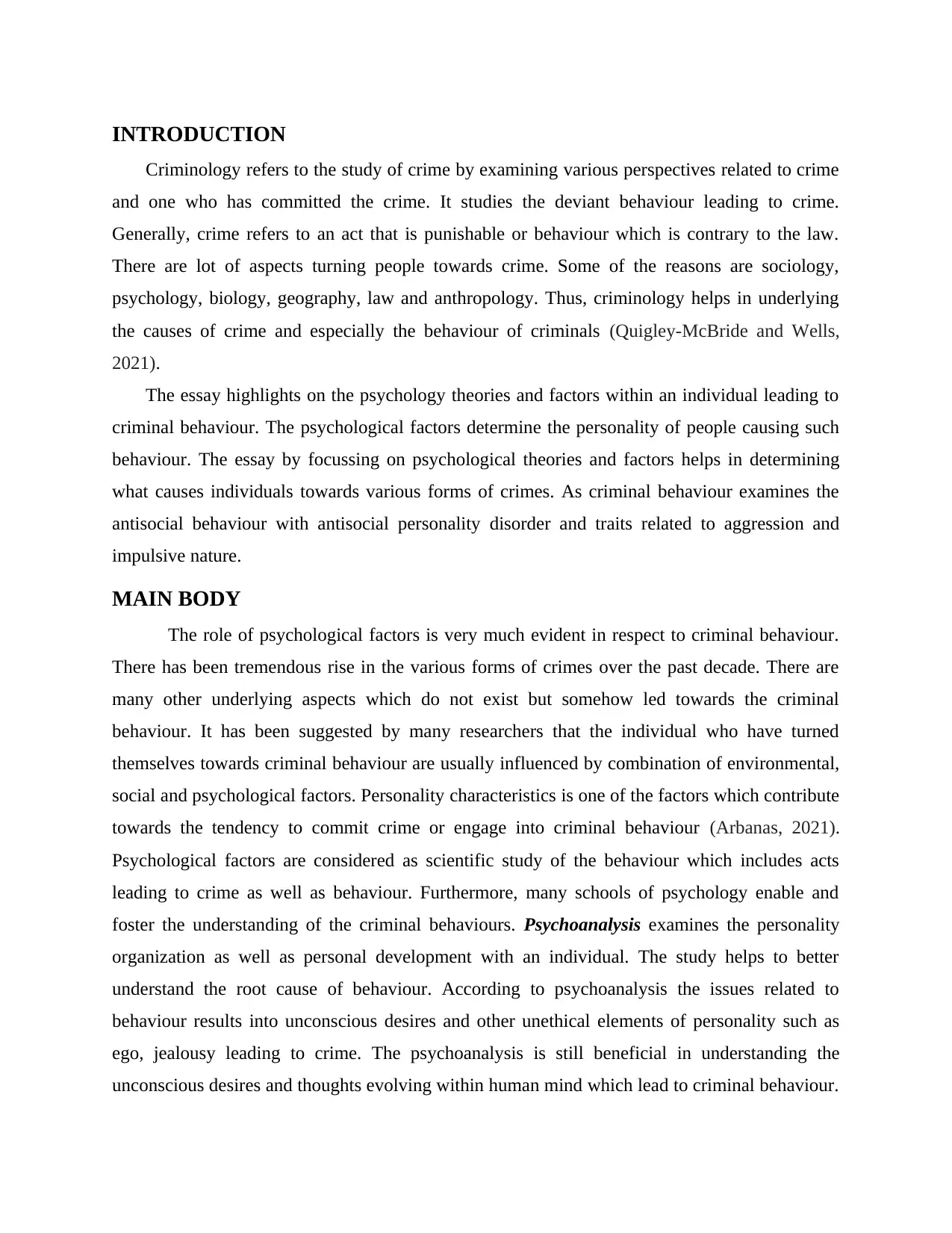
INTRODUCTION
Criminology refers to the study of crime by examining various perspectives related to crime
and one who has committed the crime. It studies the deviant behaviour leading to crime.
Generally, crime refers to an act that is punishable or behaviour which is contrary to the law.
There are lot of aspects turning people towards crime. Some of the reasons are sociology,
psychology, biology, geography, law and anthropology. Thus, criminology helps in underlying
the causes of crime and especially the behaviour of criminals (Quigley-McBride and Wells,
2021).
The essay highlights on the psychology theories and factors within an individual leading to
criminal behaviour. The psychological factors determine the personality of people causing such
behaviour. The essay by focussing on psychological theories and factors helps in determining
what causes individuals towards various forms of crimes. As criminal behaviour examines the
antisocial behaviour with antisocial personality disorder and traits related to aggression and
impulsive nature.
MAIN BODY
The role of psychological factors is very much evident in respect to criminal behaviour.
There has been tremendous rise in the various forms of crimes over the past decade. There are
many other underlying aspects which do not exist but somehow led towards the criminal
behaviour. It has been suggested by many researchers that the individual who have turned
themselves towards criminal behaviour are usually influenced by combination of environmental,
social and psychological factors. Personality characteristics is one of the factors which contribute
towards the tendency to commit crime or engage into criminal behaviour (Arbanas, 2021).
Psychological factors are considered as scientific study of the behaviour which includes acts
leading to crime as well as behaviour. Furthermore, many schools of psychology enable and
foster the understanding of the criminal behaviours. Psychoanalysis examines the personality
organization as well as personal development with an individual. The study helps to better
understand the root cause of behaviour. According to psychoanalysis the issues related to
behaviour results into unconscious desires and other unethical elements of personality such as
ego, jealousy leading to crime. The psychoanalysis is still beneficial in understanding the
unconscious desires and thoughts evolving within human mind which lead to criminal behaviour.
Criminology refers to the study of crime by examining various perspectives related to crime
and one who has committed the crime. It studies the deviant behaviour leading to crime.
Generally, crime refers to an act that is punishable or behaviour which is contrary to the law.
There are lot of aspects turning people towards crime. Some of the reasons are sociology,
psychology, biology, geography, law and anthropology. Thus, criminology helps in underlying
the causes of crime and especially the behaviour of criminals (Quigley-McBride and Wells,
2021).
The essay highlights on the psychology theories and factors within an individual leading to
criminal behaviour. The psychological factors determine the personality of people causing such
behaviour. The essay by focussing on psychological theories and factors helps in determining
what causes individuals towards various forms of crimes. As criminal behaviour examines the
antisocial behaviour with antisocial personality disorder and traits related to aggression and
impulsive nature.
MAIN BODY
The role of psychological factors is very much evident in respect to criminal behaviour.
There has been tremendous rise in the various forms of crimes over the past decade. There are
many other underlying aspects which do not exist but somehow led towards the criminal
behaviour. It has been suggested by many researchers that the individual who have turned
themselves towards criminal behaviour are usually influenced by combination of environmental,
social and psychological factors. Personality characteristics is one of the factors which contribute
towards the tendency to commit crime or engage into criminal behaviour (Arbanas, 2021).
Psychological factors are considered as scientific study of the behaviour which includes acts
leading to crime as well as behaviour. Furthermore, many schools of psychology enable and
foster the understanding of the criminal behaviours. Psychoanalysis examines the personality
organization as well as personal development with an individual. The study helps to better
understand the root cause of behaviour. According to psychoanalysis the issues related to
behaviour results into unconscious desires and other unethical elements of personality such as
ego, jealousy leading to crime. The psychoanalysis is still beneficial in understanding the
unconscious desires and thoughts evolving within human mind which lead to criminal behaviour.
⊘ This is a preview!⊘
Do you want full access?
Subscribe today to unlock all pages.

Trusted by 1+ million students worldwide
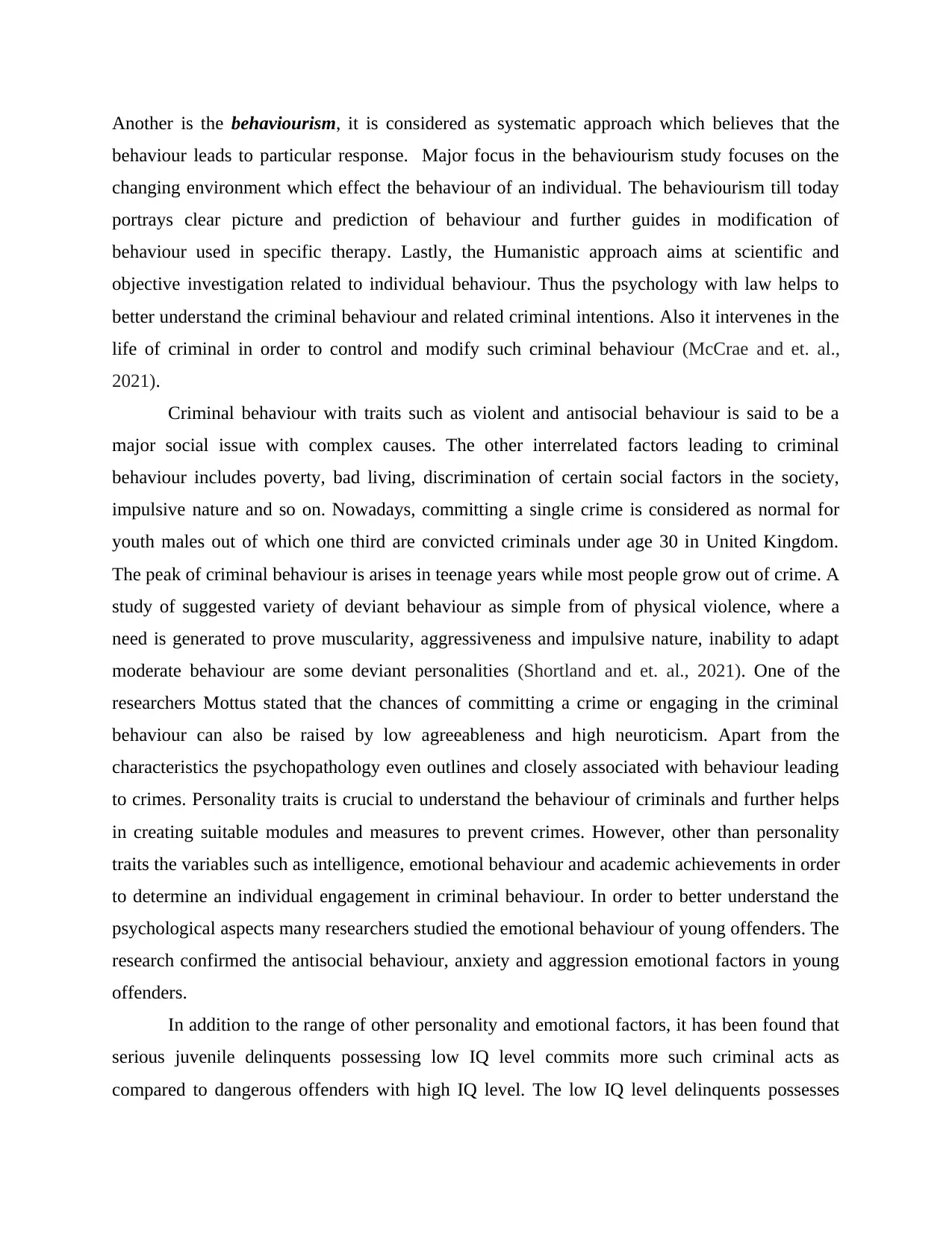
Another is the behaviourism, it is considered as systematic approach which believes that the
behaviour leads to particular response. Major focus in the behaviourism study focuses on the
changing environment which effect the behaviour of an individual. The behaviourism till today
portrays clear picture and prediction of behaviour and further guides in modification of
behaviour used in specific therapy. Lastly, the Humanistic approach aims at scientific and
objective investigation related to individual behaviour. Thus the psychology with law helps to
better understand the criminal behaviour and related criminal intentions. Also it intervenes in the
life of criminal in order to control and modify such criminal behaviour (McCrae and et. al.,
2021).
Criminal behaviour with traits such as violent and antisocial behaviour is said to be a
major social issue with complex causes. The other interrelated factors leading to criminal
behaviour includes poverty, bad living, discrimination of certain social factors in the society,
impulsive nature and so on. Nowadays, committing a single crime is considered as normal for
youth males out of which one third are convicted criminals under age 30 in United Kingdom.
The peak of criminal behaviour is arises in teenage years while most people grow out of crime. A
study of suggested variety of deviant behaviour as simple from of physical violence, where a
need is generated to prove muscularity, aggressiveness and impulsive nature, inability to adapt
moderate behaviour are some deviant personalities (Shortland and et. al., 2021). One of the
researchers Mottus stated that the chances of committing a crime or engaging in the criminal
behaviour can also be raised by low agreeableness and high neuroticism. Apart from the
characteristics the psychopathology even outlines and closely associated with behaviour leading
to crimes. Personality traits is crucial to understand the behaviour of criminals and further helps
in creating suitable modules and measures to prevent crimes. However, other than personality
traits the variables such as intelligence, emotional behaviour and academic achievements in order
to determine an individual engagement in criminal behaviour. In order to better understand the
psychological aspects many researchers studied the emotional behaviour of young offenders. The
research confirmed the antisocial behaviour, anxiety and aggression emotional factors in young
offenders.
In addition to the range of other personality and emotional factors, it has been found that
serious juvenile delinquents possessing low IQ level commits more such criminal acts as
compared to dangerous offenders with high IQ level. The low IQ level delinquents possesses
behaviour leads to particular response. Major focus in the behaviourism study focuses on the
changing environment which effect the behaviour of an individual. The behaviourism till today
portrays clear picture and prediction of behaviour and further guides in modification of
behaviour used in specific therapy. Lastly, the Humanistic approach aims at scientific and
objective investigation related to individual behaviour. Thus the psychology with law helps to
better understand the criminal behaviour and related criminal intentions. Also it intervenes in the
life of criminal in order to control and modify such criminal behaviour (McCrae and et. al.,
2021).
Criminal behaviour with traits such as violent and antisocial behaviour is said to be a
major social issue with complex causes. The other interrelated factors leading to criminal
behaviour includes poverty, bad living, discrimination of certain social factors in the society,
impulsive nature and so on. Nowadays, committing a single crime is considered as normal for
youth males out of which one third are convicted criminals under age 30 in United Kingdom.
The peak of criminal behaviour is arises in teenage years while most people grow out of crime. A
study of suggested variety of deviant behaviour as simple from of physical violence, where a
need is generated to prove muscularity, aggressiveness and impulsive nature, inability to adapt
moderate behaviour are some deviant personalities (Shortland and et. al., 2021). One of the
researchers Mottus stated that the chances of committing a crime or engaging in the criminal
behaviour can also be raised by low agreeableness and high neuroticism. Apart from the
characteristics the psychopathology even outlines and closely associated with behaviour leading
to crimes. Personality traits is crucial to understand the behaviour of criminals and further helps
in creating suitable modules and measures to prevent crimes. However, other than personality
traits the variables such as intelligence, emotional behaviour and academic achievements in order
to determine an individual engagement in criminal behaviour. In order to better understand the
psychological aspects many researchers studied the emotional behaviour of young offenders. The
research confirmed the antisocial behaviour, anxiety and aggression emotional factors in young
offenders.
In addition to the range of other personality and emotional factors, it has been found that
serious juvenile delinquents possessing low IQ level commits more such criminal acts as
compared to dangerous offenders with high IQ level. The low IQ level delinquents possesses
Paraphrase This Document
Need a fresh take? Get an instant paraphrase of this document with our AI Paraphraser
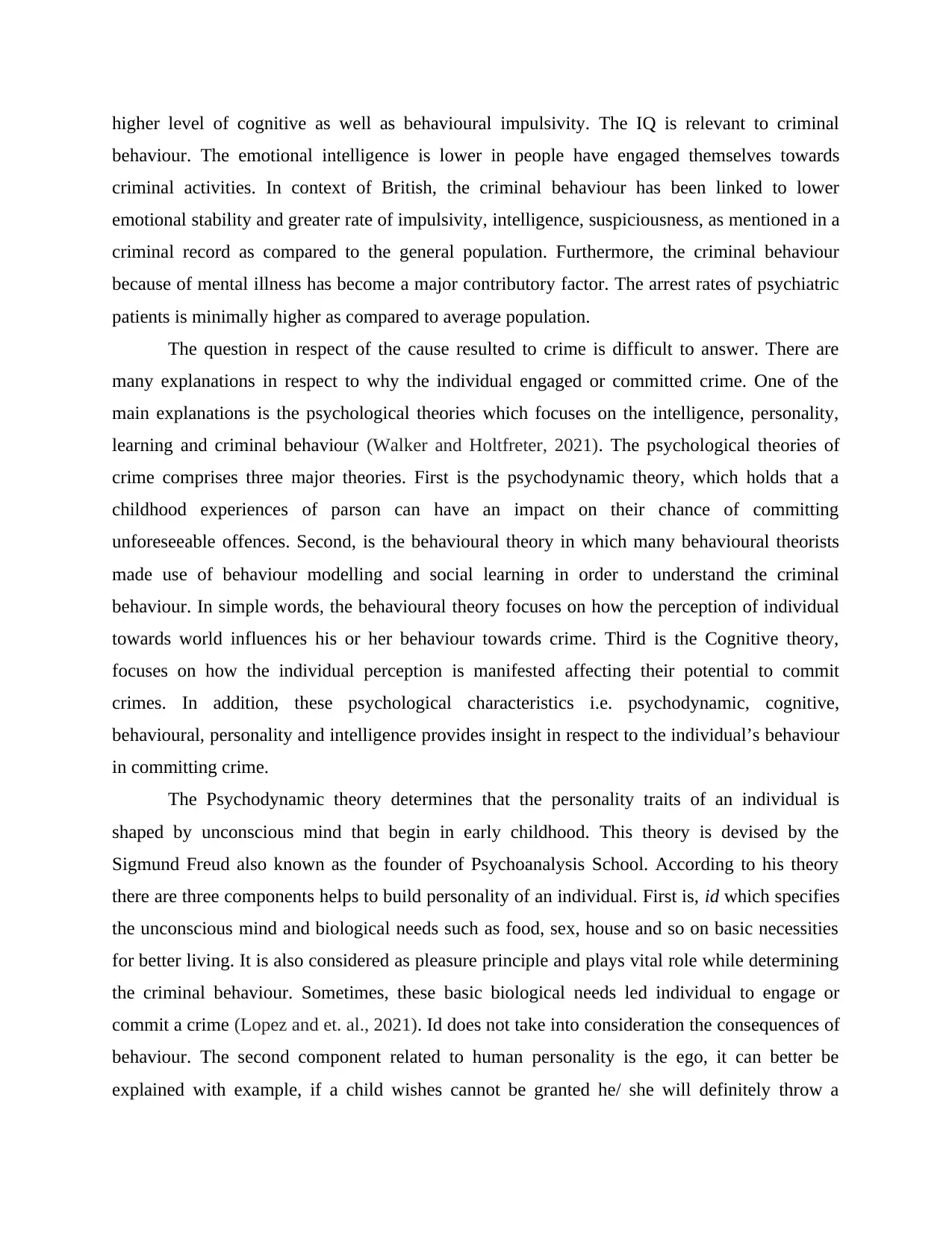
higher level of cognitive as well as behavioural impulsivity. The IQ is relevant to criminal
behaviour. The emotional intelligence is lower in people have engaged themselves towards
criminal activities. In context of British, the criminal behaviour has been linked to lower
emotional stability and greater rate of impulsivity, intelligence, suspiciousness, as mentioned in a
criminal record as compared to the general population. Furthermore, the criminal behaviour
because of mental illness has become a major contributory factor. The arrest rates of psychiatric
patients is minimally higher as compared to average population.
The question in respect of the cause resulted to crime is difficult to answer. There are
many explanations in respect to why the individual engaged or committed crime. One of the
main explanations is the psychological theories which focuses on the intelligence, personality,
learning and criminal behaviour (Walker and Holtfreter, 2021). The psychological theories of
crime comprises three major theories. First is the psychodynamic theory, which holds that a
childhood experiences of parson can have an impact on their chance of committing
unforeseeable offences. Second, is the behavioural theory in which many behavioural theorists
made use of behaviour modelling and social learning in order to understand the criminal
behaviour. In simple words, the behavioural theory focuses on how the perception of individual
towards world influences his or her behaviour towards crime. Third is the Cognitive theory,
focuses on how the individual perception is manifested affecting their potential to commit
crimes. In addition, these psychological characteristics i.e. psychodynamic, cognitive,
behavioural, personality and intelligence provides insight in respect to the individual’s behaviour
in committing crime.
The Psychodynamic theory determines that the personality traits of an individual is
shaped by unconscious mind that begin in early childhood. This theory is devised by the
Sigmund Freud also known as the founder of Psychoanalysis School. According to his theory
there are three components helps to build personality of an individual. First is, id which specifies
the unconscious mind and biological needs such as food, sex, house and so on basic necessities
for better living. It is also considered as pleasure principle and plays vital role while determining
the criminal behaviour. Sometimes, these basic biological needs led individual to engage or
commit a crime (Lopez and et. al., 2021). Id does not take into consideration the consequences of
behaviour. The second component related to human personality is the ego, it can better be
explained with example, if a child wishes cannot be granted he/ she will definitely throw a
behaviour. The emotional intelligence is lower in people have engaged themselves towards
criminal activities. In context of British, the criminal behaviour has been linked to lower
emotional stability and greater rate of impulsivity, intelligence, suspiciousness, as mentioned in a
criminal record as compared to the general population. Furthermore, the criminal behaviour
because of mental illness has become a major contributory factor. The arrest rates of psychiatric
patients is minimally higher as compared to average population.
The question in respect of the cause resulted to crime is difficult to answer. There are
many explanations in respect to why the individual engaged or committed crime. One of the
main explanations is the psychological theories which focuses on the intelligence, personality,
learning and criminal behaviour (Walker and Holtfreter, 2021). The psychological theories of
crime comprises three major theories. First is the psychodynamic theory, which holds that a
childhood experiences of parson can have an impact on their chance of committing
unforeseeable offences. Second, is the behavioural theory in which many behavioural theorists
made use of behaviour modelling and social learning in order to understand the criminal
behaviour. In simple words, the behavioural theory focuses on how the perception of individual
towards world influences his or her behaviour towards crime. Third is the Cognitive theory,
focuses on how the individual perception is manifested affecting their potential to commit
crimes. In addition, these psychological characteristics i.e. psychodynamic, cognitive,
behavioural, personality and intelligence provides insight in respect to the individual’s behaviour
in committing crime.
The Psychodynamic theory determines that the personality traits of an individual is
shaped by unconscious mind that begin in early childhood. This theory is devised by the
Sigmund Freud also known as the founder of Psychoanalysis School. According to his theory
there are three components helps to build personality of an individual. First is, id which specifies
the unconscious mind and biological needs such as food, sex, house and so on basic necessities
for better living. It is also considered as pleasure principle and plays vital role while determining
the criminal behaviour. Sometimes, these basic biological needs led individual to engage or
commit a crime (Lopez and et. al., 2021). Id does not take into consideration the consequences of
behaviour. The second component related to human personality is the ego, it can better be
explained with example, if a child wishes cannot be granted he/ she will definitely throw a
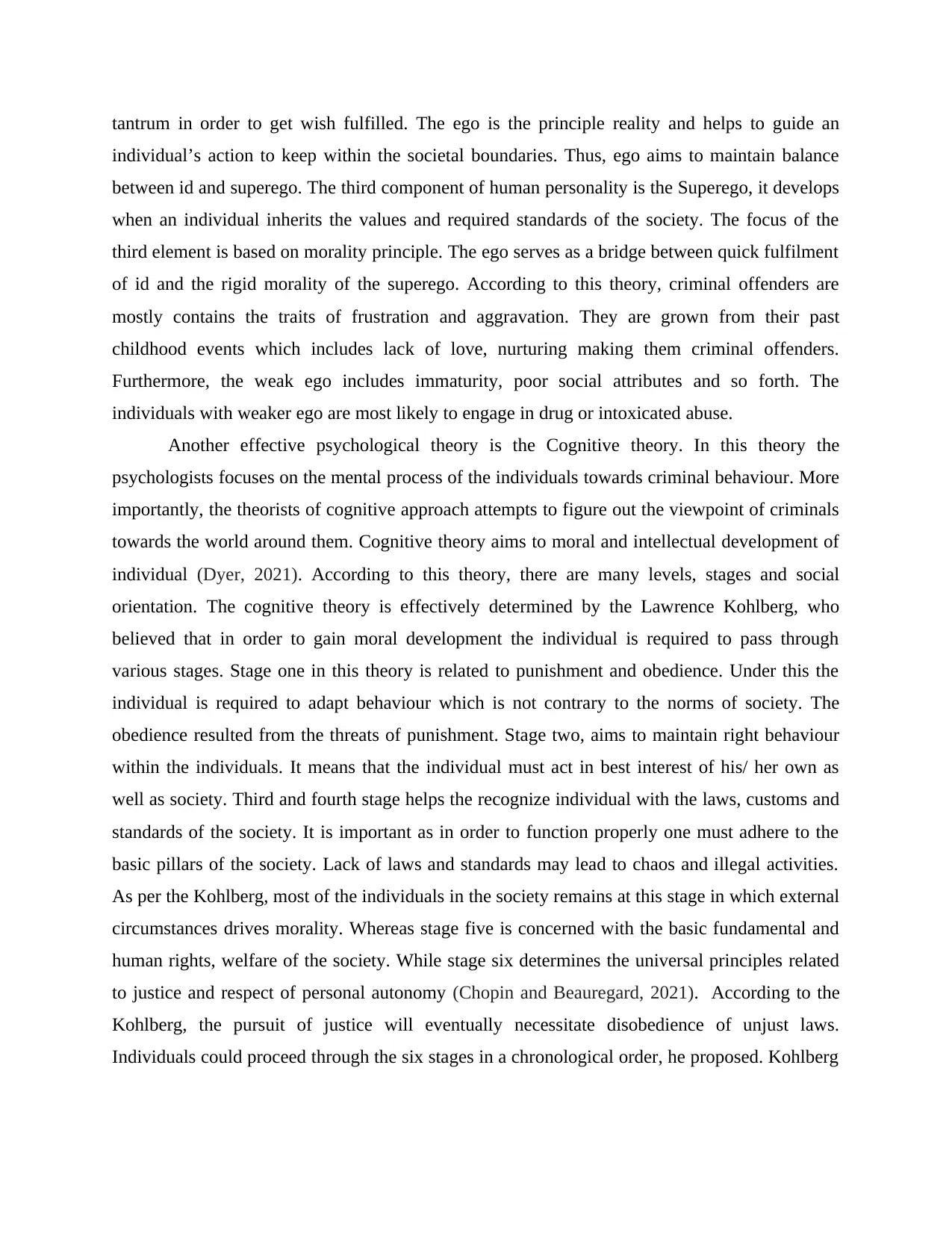
tantrum in order to get wish fulfilled. The ego is the principle reality and helps to guide an
individual’s action to keep within the societal boundaries. Thus, ego aims to maintain balance
between id and superego. The third component of human personality is the Superego, it develops
when an individual inherits the values and required standards of the society. The focus of the
third element is based on morality principle. The ego serves as a bridge between quick fulfilment
of id and the rigid morality of the superego. According to this theory, criminal offenders are
mostly contains the traits of frustration and aggravation. They are grown from their past
childhood events which includes lack of love, nurturing making them criminal offenders.
Furthermore, the weak ego includes immaturity, poor social attributes and so forth. The
individuals with weaker ego are most likely to engage in drug or intoxicated abuse.
Another effective psychological theory is the Cognitive theory. In this theory the
psychologists focuses on the mental process of the individuals towards criminal behaviour. More
importantly, the theorists of cognitive approach attempts to figure out the viewpoint of criminals
towards the world around them. Cognitive theory aims to moral and intellectual development of
individual (Dyer, 2021). According to this theory, there are many levels, stages and social
orientation. The cognitive theory is effectively determined by the Lawrence Kohlberg, who
believed that in order to gain moral development the individual is required to pass through
various stages. Stage one in this theory is related to punishment and obedience. Under this the
individual is required to adapt behaviour which is not contrary to the norms of society. The
obedience resulted from the threats of punishment. Stage two, aims to maintain right behaviour
within the individuals. It means that the individual must act in best interest of his/ her own as
well as society. Third and fourth stage helps the recognize individual with the laws, customs and
standards of the society. It is important as in order to function properly one must adhere to the
basic pillars of the society. Lack of laws and standards may lead to chaos and illegal activities.
As per the Kohlberg, most of the individuals in the society remains at this stage in which external
circumstances drives morality. Whereas stage five is concerned with the basic fundamental and
human rights, welfare of the society. While stage six determines the universal principles related
to justice and respect of personal autonomy (Chopin and Beauregard, 2021). According to the
Kohlberg, the pursuit of justice will eventually necessitate disobedience of unjust laws.
Individuals could proceed through the six stages in a chronological order, he proposed. Kohlberg
individual’s action to keep within the societal boundaries. Thus, ego aims to maintain balance
between id and superego. The third component of human personality is the Superego, it develops
when an individual inherits the values and required standards of the society. The focus of the
third element is based on morality principle. The ego serves as a bridge between quick fulfilment
of id and the rigid morality of the superego. According to this theory, criminal offenders are
mostly contains the traits of frustration and aggravation. They are grown from their past
childhood events which includes lack of love, nurturing making them criminal offenders.
Furthermore, the weak ego includes immaturity, poor social attributes and so forth. The
individuals with weaker ego are most likely to engage in drug or intoxicated abuse.
Another effective psychological theory is the Cognitive theory. In this theory the
psychologists focuses on the mental process of the individuals towards criminal behaviour. More
importantly, the theorists of cognitive approach attempts to figure out the viewpoint of criminals
towards the world around them. Cognitive theory aims to moral and intellectual development of
individual (Dyer, 2021). According to this theory, there are many levels, stages and social
orientation. The cognitive theory is effectively determined by the Lawrence Kohlberg, who
believed that in order to gain moral development the individual is required to pass through
various stages. Stage one in this theory is related to punishment and obedience. Under this the
individual is required to adapt behaviour which is not contrary to the norms of society. The
obedience resulted from the threats of punishment. Stage two, aims to maintain right behaviour
within the individuals. It means that the individual must act in best interest of his/ her own as
well as society. Third and fourth stage helps the recognize individual with the laws, customs and
standards of the society. It is important as in order to function properly one must adhere to the
basic pillars of the society. Lack of laws and standards may lead to chaos and illegal activities.
As per the Kohlberg, most of the individuals in the society remains at this stage in which external
circumstances drives morality. Whereas stage five is concerned with the basic fundamental and
human rights, welfare of the society. While stage six determines the universal principles related
to justice and respect of personal autonomy (Chopin and Beauregard, 2021). According to the
Kohlberg, the pursuit of justice will eventually necessitate disobedience of unjust laws.
Individuals could proceed through the six stages in a chronological order, he proposed. Kohlberg
⊘ This is a preview!⊘
Do you want full access?
Subscribe today to unlock all pages.

Trusted by 1+ million students worldwide
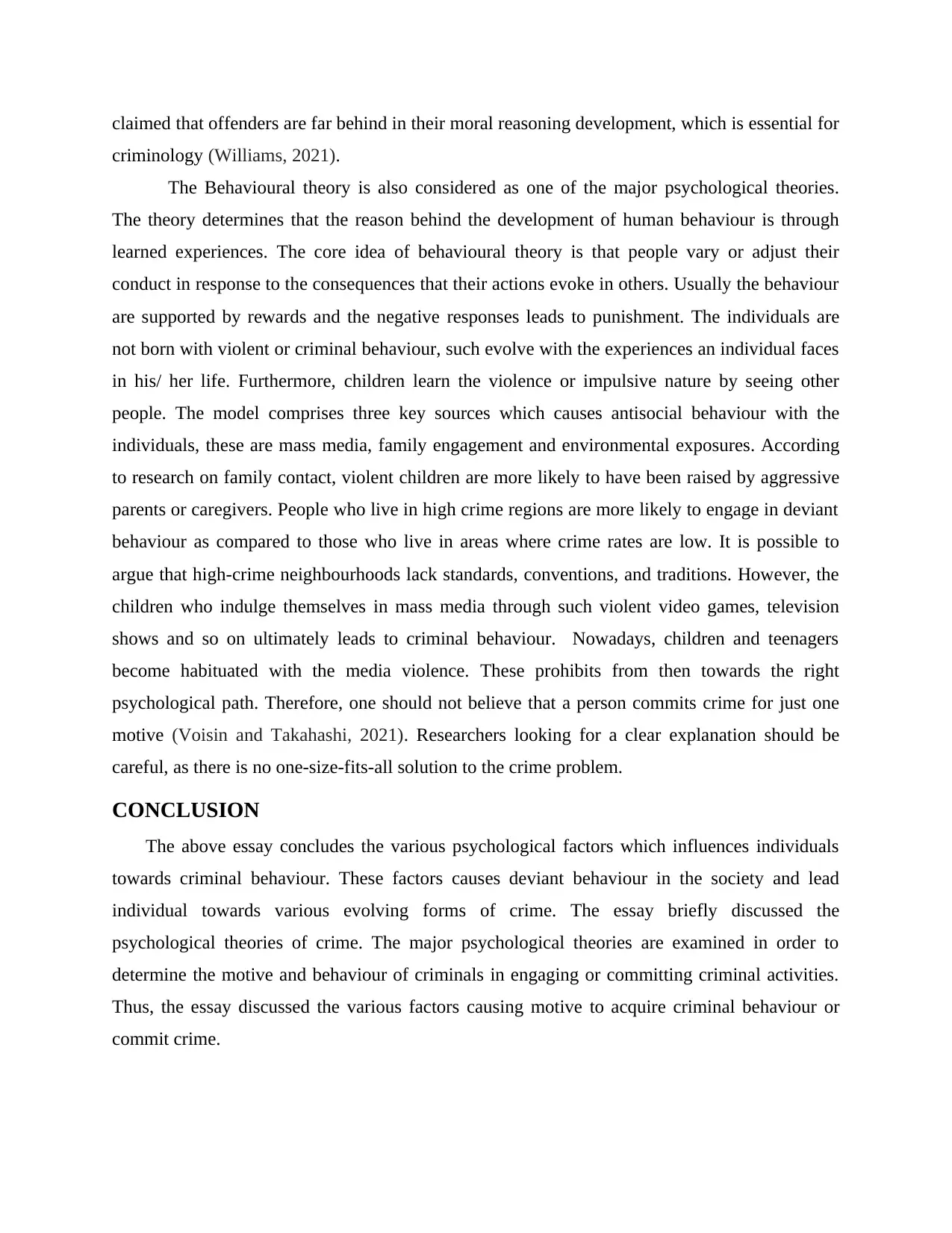
claimed that offenders are far behind in their moral reasoning development, which is essential for
criminology (Williams, 2021).
The Behavioural theory is also considered as one of the major psychological theories.
The theory determines that the reason behind the development of human behaviour is through
learned experiences. The core idea of behavioural theory is that people vary or adjust their
conduct in response to the consequences that their actions evoke in others. Usually the behaviour
are supported by rewards and the negative responses leads to punishment. The individuals are
not born with violent or criminal behaviour, such evolve with the experiences an individual faces
in his/ her life. Furthermore, children learn the violence or impulsive nature by seeing other
people. The model comprises three key sources which causes antisocial behaviour with the
individuals, these are mass media, family engagement and environmental exposures. According
to research on family contact, violent children are more likely to have been raised by aggressive
parents or caregivers. People who live in high crime regions are more likely to engage in deviant
behaviour as compared to those who live in areas where crime rates are low. It is possible to
argue that high-crime neighbourhoods lack standards, conventions, and traditions. However, the
children who indulge themselves in mass media through such violent video games, television
shows and so on ultimately leads to criminal behaviour. Nowadays, children and teenagers
become habituated with the media violence. These prohibits from then towards the right
psychological path. Therefore, one should not believe that a person commits crime for just one
motive (Voisin and Takahashi, 2021). Researchers looking for a clear explanation should be
careful, as there is no one-size-fits-all solution to the crime problem.
CONCLUSION
The above essay concludes the various psychological factors which influences individuals
towards criminal behaviour. These factors causes deviant behaviour in the society and lead
individual towards various evolving forms of crime. The essay briefly discussed the
psychological theories of crime. The major psychological theories are examined in order to
determine the motive and behaviour of criminals in engaging or committing criminal activities.
Thus, the essay discussed the various factors causing motive to acquire criminal behaviour or
commit crime.
criminology (Williams, 2021).
The Behavioural theory is also considered as one of the major psychological theories.
The theory determines that the reason behind the development of human behaviour is through
learned experiences. The core idea of behavioural theory is that people vary or adjust their
conduct in response to the consequences that their actions evoke in others. Usually the behaviour
are supported by rewards and the negative responses leads to punishment. The individuals are
not born with violent or criminal behaviour, such evolve with the experiences an individual faces
in his/ her life. Furthermore, children learn the violence or impulsive nature by seeing other
people. The model comprises three key sources which causes antisocial behaviour with the
individuals, these are mass media, family engagement and environmental exposures. According
to research on family contact, violent children are more likely to have been raised by aggressive
parents or caregivers. People who live in high crime regions are more likely to engage in deviant
behaviour as compared to those who live in areas where crime rates are low. It is possible to
argue that high-crime neighbourhoods lack standards, conventions, and traditions. However, the
children who indulge themselves in mass media through such violent video games, television
shows and so on ultimately leads to criminal behaviour. Nowadays, children and teenagers
become habituated with the media violence. These prohibits from then towards the right
psychological path. Therefore, one should not believe that a person commits crime for just one
motive (Voisin and Takahashi, 2021). Researchers looking for a clear explanation should be
careful, as there is no one-size-fits-all solution to the crime problem.
CONCLUSION
The above essay concludes the various psychological factors which influences individuals
towards criminal behaviour. These factors causes deviant behaviour in the society and lead
individual towards various evolving forms of crime. The essay briefly discussed the
psychological theories of crime. The major psychological theories are examined in order to
determine the motive and behaviour of criminals in engaging or committing criminal activities.
Thus, the essay discussed the various factors causing motive to acquire criminal behaviour or
commit crime.
Paraphrase This Document
Need a fresh take? Get an instant paraphrase of this document with our AI Paraphraser
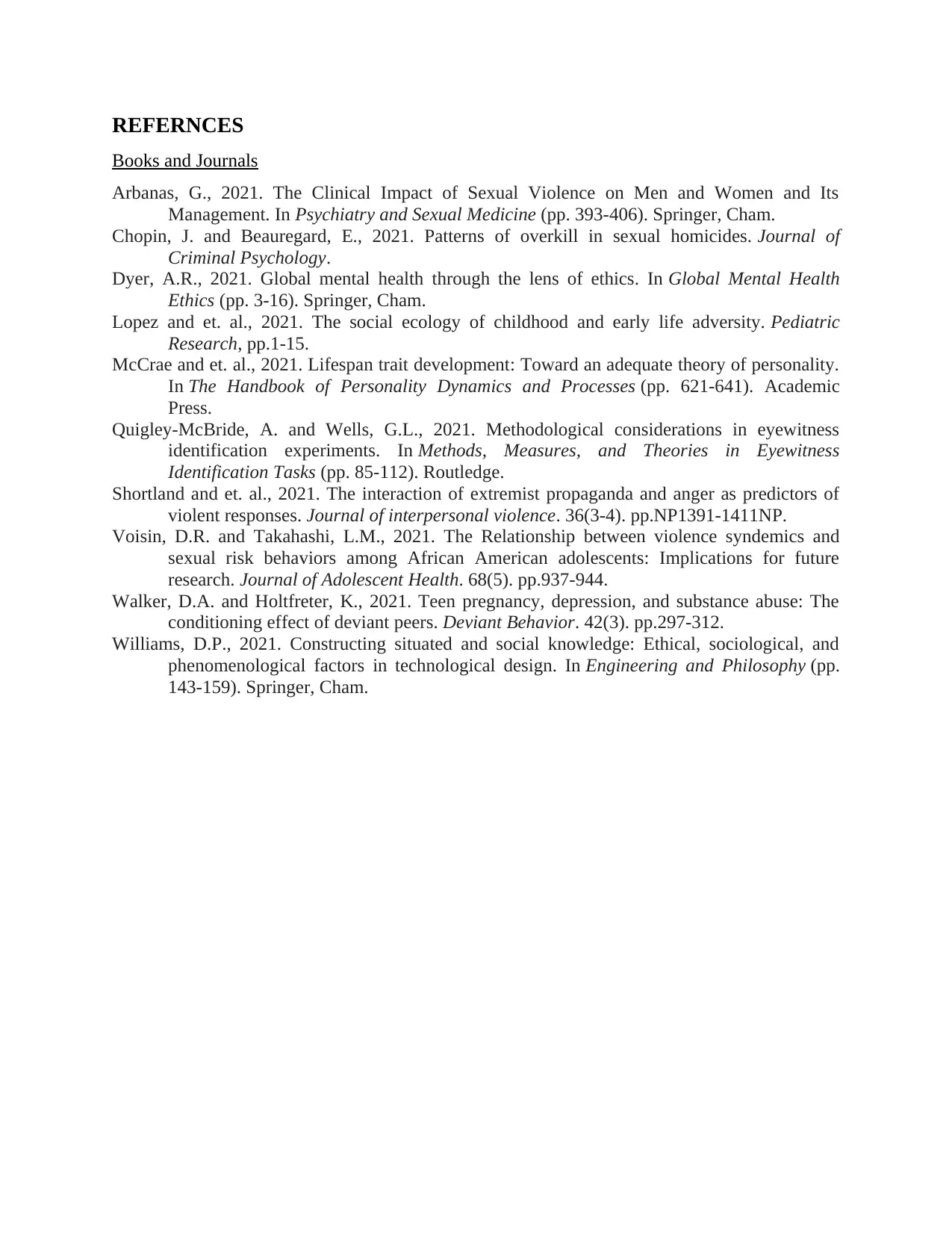
REFERNCES
Books and Journals
Arbanas, G., 2021. The Clinical Impact of Sexual Violence on Men and Women and Its
Management. In Psychiatry and Sexual Medicine (pp. 393-406). Springer, Cham.
Chopin, J. and Beauregard, E., 2021. Patterns of overkill in sexual homicides. Journal of
Criminal Psychology.
Dyer, A.R., 2021. Global mental health through the lens of ethics. In Global Mental Health
Ethics (pp. 3-16). Springer, Cham.
Lopez and et. al., 2021. The social ecology of childhood and early life adversity. Pediatric
Research, pp.1-15.
McCrae and et. al., 2021. Lifespan trait development: Toward an adequate theory of personality.
In The Handbook of Personality Dynamics and Processes (pp. 621-641). Academic
Press.
Quigley-McBride, A. and Wells, G.L., 2021. Methodological considerations in eyewitness
identification experiments. In Methods, Measures, and Theories in Eyewitness
Identification Tasks (pp. 85-112). Routledge.
Shortland and et. al., 2021. The interaction of extremist propaganda and anger as predictors of
violent responses. Journal of interpersonal violence. 36(3-4). pp.NP1391-1411NP.
Voisin, D.R. and Takahashi, L.M., 2021. The Relationship between violence syndemics and
sexual risk behaviors among African American adolescents: Implications for future
research. Journal of Adolescent Health. 68(5). pp.937-944.
Walker, D.A. and Holtfreter, K., 2021. Teen pregnancy, depression, and substance abuse: The
conditioning effect of deviant peers. Deviant Behavior. 42(3). pp.297-312.
Williams, D.P., 2021. Constructing situated and social knowledge: Ethical, sociological, and
phenomenological factors in technological design. In Engineering and Philosophy (pp.
143-159). Springer, Cham.
Books and Journals
Arbanas, G., 2021. The Clinical Impact of Sexual Violence on Men and Women and Its
Management. In Psychiatry and Sexual Medicine (pp. 393-406). Springer, Cham.
Chopin, J. and Beauregard, E., 2021. Patterns of overkill in sexual homicides. Journal of
Criminal Psychology.
Dyer, A.R., 2021. Global mental health through the lens of ethics. In Global Mental Health
Ethics (pp. 3-16). Springer, Cham.
Lopez and et. al., 2021. The social ecology of childhood and early life adversity. Pediatric
Research, pp.1-15.
McCrae and et. al., 2021. Lifespan trait development: Toward an adequate theory of personality.
In The Handbook of Personality Dynamics and Processes (pp. 621-641). Academic
Press.
Quigley-McBride, A. and Wells, G.L., 2021. Methodological considerations in eyewitness
identification experiments. In Methods, Measures, and Theories in Eyewitness
Identification Tasks (pp. 85-112). Routledge.
Shortland and et. al., 2021. The interaction of extremist propaganda and anger as predictors of
violent responses. Journal of interpersonal violence. 36(3-4). pp.NP1391-1411NP.
Voisin, D.R. and Takahashi, L.M., 2021. The Relationship between violence syndemics and
sexual risk behaviors among African American adolescents: Implications for future
research. Journal of Adolescent Health. 68(5). pp.937-944.
Walker, D.A. and Holtfreter, K., 2021. Teen pregnancy, depression, and substance abuse: The
conditioning effect of deviant peers. Deviant Behavior. 42(3). pp.297-312.
Williams, D.P., 2021. Constructing situated and social knowledge: Ethical, sociological, and
phenomenological factors in technological design. In Engineering and Philosophy (pp.
143-159). Springer, Cham.
1 out of 8
Related Documents
Your All-in-One AI-Powered Toolkit for Academic Success.
+13062052269
info@desklib.com
Available 24*7 on WhatsApp / Email
![[object Object]](/_next/static/media/star-bottom.7253800d.svg)
Unlock your academic potential
Copyright © 2020–2025 A2Z Services. All Rights Reserved. Developed and managed by ZUCOL.





